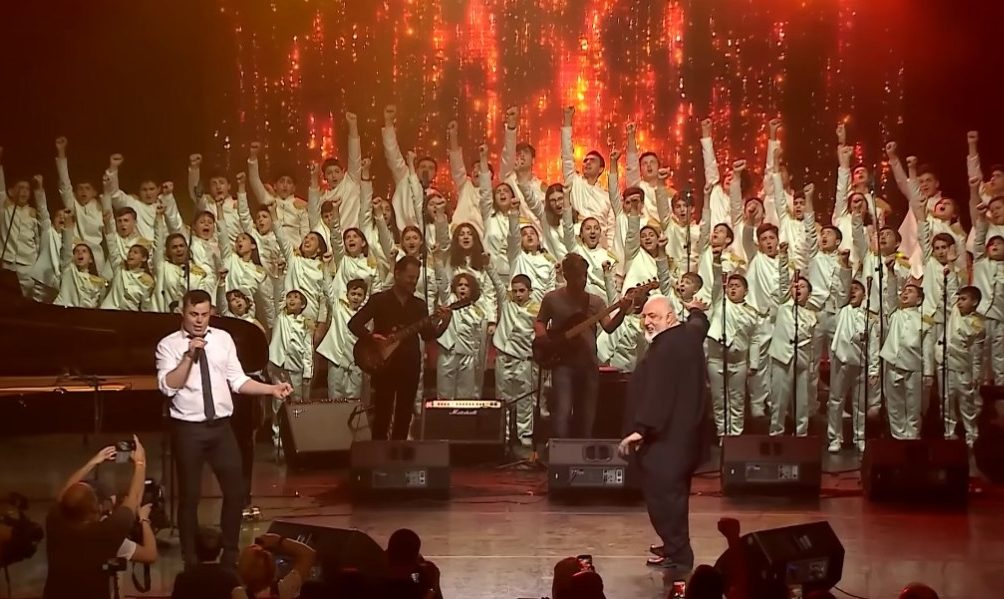The stage lights flickered to life, casting a soft glow over the performers below. The crowd fell silent, a sense of anticipation thick in the air. It was an ordinary evening at the grand concert hall, but tonight, something extraordinary was about to unfold.
Marc Martel, the renowned singer known for his uncanny ability to channel Freddie Mercury’s voice, stood center stage, his gaze fixed on the awaiting audience. Beside him, the Tbilisi Children’s Capella, a talented choir of young voices, stood in perfect formation. Their innocent faces, filled with excitement, were framed by the dark backdrop of the stage, while the grandeur of the hall echoed with their collective potential. Together, they were about to take on a monumental challenge: Bohemian Rhapsody, the legendary Queen anthem.
As the first soft notes of the piano echoed through the theater, Marc’s voice, with its rich, deep resonance, began to fill the space. His vocal delivery was almost a whisper at first, building the tension, but it was unmistakably his—raw and powerful, evoking memories of the late Freddie Mercury. The audience sat, spellbound, as Marc’s voice blended seamlessly with the delicate harmonies of the children’s choir.
Then, as the song reached its iconic operatic section, something magical happened. The children’s voices—pure, clear, and sweet—rose in unison, perfectly complementing Marc’s soaring tenor. Together, they created an atmosphere that felt ethereal, as if the music itself had lifted them all into another realm.
The choir’s voices were a striking contrast to the heavy guitar riffs that suddenly pierced through the soundscape. As the song’s energy picked up, the children’s enthusiasm intensified, and their harmonies became an integral part of the piece’s complexity. Marc’s voice shifted effortlessly between Mercury’s characteristic power and delicate falsetto, each note carrying an emotional depth that seemed to transcend the boundaries of time and genre.
The audience was entranced. There were moments of pure beauty—when Marc hit a high note that sent chills down everyone’s spine, and when the children’s voices swelled with such clarity that it felt as if the entire room was holding its breath. And then, just as the song reached its climactic finish, the music reached an intensity that felt like a storm breaking.
The performance was a whirlwind—a blend of the operatic, the rock anthem, and the voices of children who had yet to experience the hardships of life but carried with them the purest expression of emotion through song. The sound was epic, spine-tingling, and hauntingly beautiful, a version of Bohemian Rhapsody that felt brand new and yet entirely familiar.
As the final chords faded, the theater erupted into applause, the energy in the room so powerful it felt like a wave crashing over everyone present. Marc Martel and the Tbilisi Children’s Capella stood together on stage, their faces glowing with the satisfaction of creating something truly special. The audience, still in awe, rose to their feet, the ovation filling the hall with an intensity that matched the performance itself.
In that moment, it wasn’t just about the song or the performers—it was about the feeling that had been shared between them and the audience, a shared experience that would live on in their memories. They had taken an iconic Queen song, known by millions around the world, and transformed it into something entirely new—something that felt like a dream come to life.
Marc Martel and the Tbilisi Children’s Capella had given the world a gift that night: an unforgettable rendition of Bohemian Rhapsody that, like the song itself, would linger in the hearts of everyone who witnessed it, leaving them with goosebumps, chills, and the unmistakable sense that music truly has the power to transcend all boundaries.
